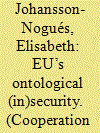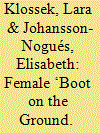| Srl | Item |
| 1 |
ID:
162437


|
|
|
|
|
| Summary/Abstract |
The 2016 EU Global Strategy and the 2015 European Neighbourhood Policy (ENP) review have made stabilisation of the ENP area one of their main priorities. Our argument here, however, is that the Global Strategy and the ENP review not only seek to mitigate the numerous crises currently affecting the neighbourhood; they also aim to address a set of intra-EU vulnerabilities linked to events in the ENP area that are threatening the EU’s own ontological security. We employ narrative analysis to explore how insecurity in the EU and in the ENP area is affecting the EU’s relation to the neighbourhood-other and its understanding of the EU-self. Our main findings point to the Global Strategy and the ENP review providing ample measures to stabilise the neighbourhood. However, whether they have provided a sufficiently compelling narrative to enable the emergence of new emotional structures for the EU and its member states to make sense of themselves and their relation to the neighbourhood-other remains an open question.
|
|
|
|
|
|
|
|
|
|
|
|
|
|
|
|
| 2 |
ID:
179550


|
|
|
|
|
| Summary/Abstract |
The Indian government has presented itself as a champion of gender mainstreaming in UN peacekeeping. At the same time, the domestic security sector in India continues to create a gender-segregated environment and experiences of uniformed women in the field show remaining barriers for gender equity. Given this contradiction, the article examines the ambivalence inherent to Indian gender mainstreaming of peacekeeping units. We argue that transnational norms, such as gender mainstreaming, are embedded in larger norm bundles, and we combine the literature of norm localization and norm contestation in our conceptual framework to illustrate how India localizes parts of the gender mainstreaming norm bundle whilst contesting others. We find that India’s localization of the gender mainstreaming norm has meant to pursue an asymmetric gender-parity approach between different branches of the Indian security forces and that it has fomented a division of labour within the police corps. Moreover, we illustrate how India contests the idea of placing women in security-sensitive areas, in combat roles, and gender-integrated police units.
|
|
|
|
|
|
|
|
|
|
|
|
|
|
|
|